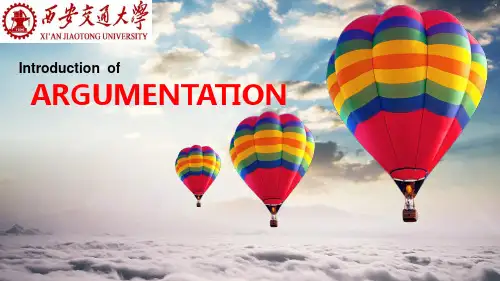实用阶梯英语写作教程课件unit 11 Argumentation
- 格式:ppt
- 大小:167.50 KB
- 文档页数:10
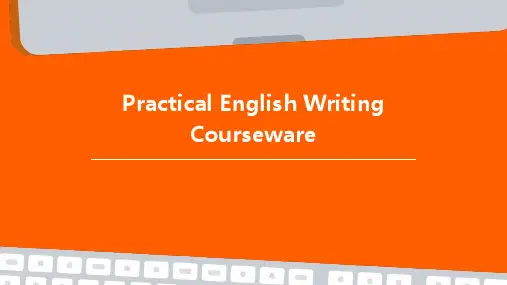
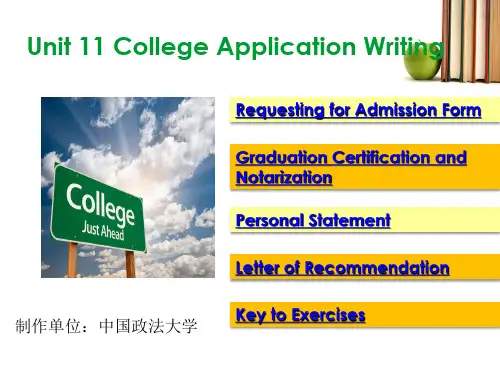
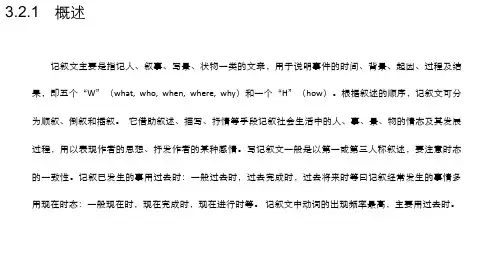

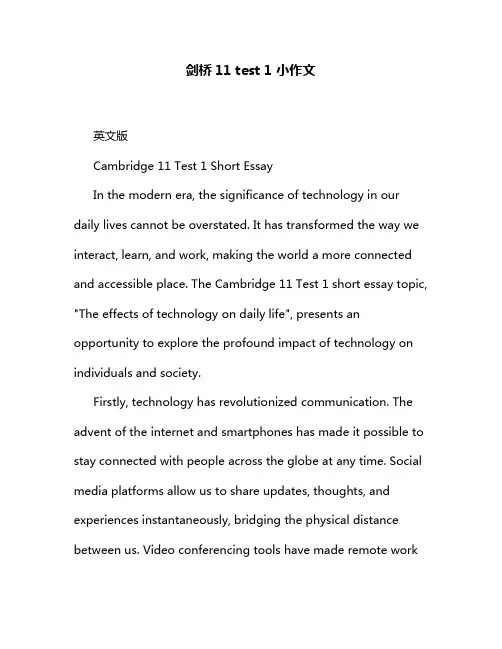
剑桥11 test 1 小作文英文版Cambridge 11 Test 1 Short EssayIn the modern era, the significance of technology in our daily lives cannot be overstated. It has transformed the way we interact, learn, and work, making the world a more connected and accessible place. The Cambridge 11 Test 1 short essay topic, "The effects of technology on daily life", presents an opportunity to explore the profound impact of technology on individuals and society.Firstly, technology has revolutionized communication. The advent of the internet and smartphones has made it possible to stay connected with people across the globe at any time. Social media platforms allow us to share updates, thoughts, and experiences instantaneously, bridging the physical distance between us. Video conferencing tools have made remote workand learning a reality, enabling individuals to participate in meetings and classes without being physically present.Moreover, technology has had a significant impact on education. Online courses and virtual classrooms have provided access to knowledge and learning opportunities for people who may not have had them otherwise. These platforms have broken down geographical barriers, allowing students from diverse backgrounds to study together and learn from each other's experiences.Additionally, technology has facilitated advancements in healthcare. Diagnostic tools and medical equipment have become more accurate and efficient, enabling doctors to make better-informed decisions about patient care. Telemedicine has also emerged as a convenient option for remote areas, allowing people to access medical services without having to travel long distances.However, it is important to acknowledge that technology also has its downsides. The excessive use of digital devices canlead to eye strain, poor posture, and other health issues. Furthermore, the constant stream of information and social media updates can contribute to stress and anxiety. Therefore, it is crucial to strike a balance between technology use and maintaining a healthy lifestyle.In conclusion, technology has had a profound impact on our daily lives, shaping the way we communicate, learn, and work. While it has brought numerous benefits, it is essential to be mindful of its potential downsides and use it responsibly. By doing so, we can harness the power of technology to improve our lives and contribute to a more connected and progressive society.中文版剑桥11测试1小作文在现代社会,科技在我们日常生活中的重要性不言而喻。
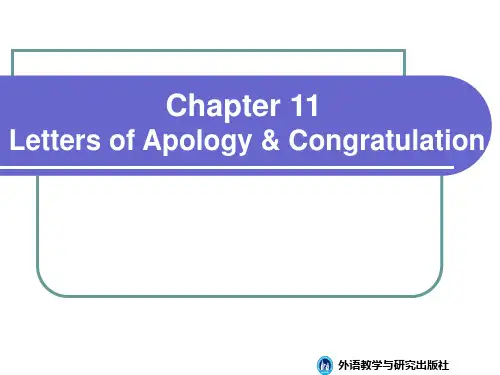

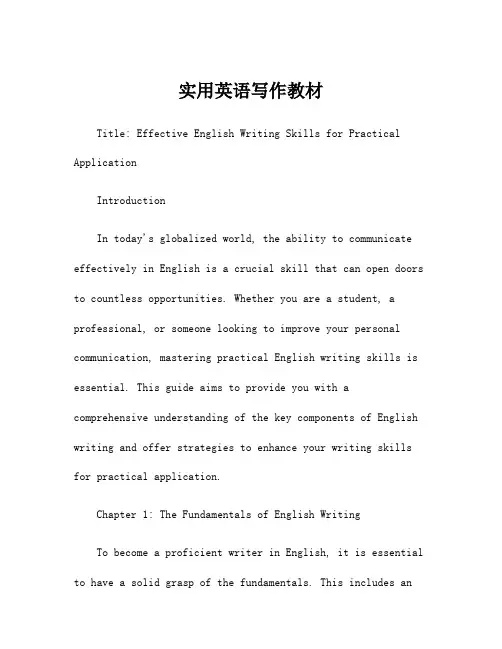
实用英语写作教材Title: Effective English Writing Skills for Practical ApplicationIntroductionIn today's globalized world, the ability to communicate effectively in English is a crucial skill that can open doors to countless opportunities. Whether you are a student, a professional, or someone looking to improve your personal communication, mastering practical English writing skills is essential. This guide aims to provide you with a comprehensive understanding of the key components of English writing and offer strategies to enhance your writing skills for practical application.Chapter 1: The Fundamentals of English WritingTo become a proficient writer in English, it is essential to have a solid grasp of the fundamentals. This includes anunderstanding of grammar, sentence structure, vocabulary, and punctuation.1.1 GrammarGrammar is the set of rules that govern the structure of sentences, phrases, and words in English. Mastering grammaris crucial as it ensures that your writing is clear, coherent, and easy to understand. Some key areas to focus on include subject-verb agreement, tense consistency, and proper use of articles.1.2 Sentence StructureVarying your sentence structure can make your writingmore engaging and interesting to read. Simple sentencesconsist of a subject, verb, and object. Compound sentencesjoin two or more independent clauses using coordinating conjunctions like 'and,' 'but,' or 'or.' Complex sentences include one or more dependent clauses introduced bysubordinating conjunctions such as 'because,' 'although,' or'since.'1.3 VocabularyA rich vocabulary allows you to express your ideas more precisely and vividly. To expand your vocabulary, read widely, use a dictionary to look up unfamiliar words, and practice using new words in your writing.1.4 PunctuationPunctuation helps to organize your thoughts and clarify your meaning. Common punctuation marks include periods, commas, apostrophes, colons, and semicolons. Each mark has a specific function and should be used appropriately to ensure clear communication.Chapter 2: Planning and Organizing Your WritingBefore you begin writing, it is important to plan and organize your ideas. This will help you to write with clarity and coherence.2.1 BrainstormingBrainstorming is a technique used to generate ideas and stimulate creativity. You can brainstorm by jotting down any thoughts that come to mind related to your topic, without worrying about their relevance or order.2.2 OutliningOutlining involves creating a framework for your writing by organizing your ideas into main points and supporting details. This can be done in a traditional outline format or in a more flexible mind map.2.3 Thesis StatementYour thesis statement is a clear, concise statement that summarizes the main point or argument of your writing. Itshould be included in your introduction and serve as a guide for the rest of your text.Chapter 3: Writing Techniques for Clarity and Coherence Once you have planned your writing, it is time to focus on the techniques that will make your text clear and easy to follow.3.1 Paragraph StructureA well-structured paragraph typically includes a topic sentence, supporting sentences, and a concluding sentence. The topic sentence introduces the main idea of the paragraph, while the supporting sentences provide evidence or elaboration. The concluding sentence summarizes the paragraph's main point or transitions to the next paragraph.3.2 Cohesive DevicesCohesive devices are words or phrases that connect ideas within and between paragraphs. They include transitionalwords (e.g., 'however,' 'therefore'), pronouns (e.g., 'it,' 'they'), and conjunctions (e.g., 'and,' 'but'). Using cohesive devices effectively can improve the flow and comprehensibility of your writing.3.3 Editing and RevisingEditing and revising are essential steps in the writing process. Editing involves checking for errors in grammar, spelling, and punctuation. Revising involves reevaluating the content and structure of your writing to ensure that your message is clear and effective. It may involve adding or deleting information, reorganizing paragraphs, or refining your thesis statement.Chapter 4: Advanced Writing StrategiesAs you become more comfortable with the basics of English writing, you can start to explore more advanced strategies to enhance your writing skills.4.1 Rhetorical DevicesRhetorical devices are techniques used to create a powerful impact on your reader. Examples include metaphors, similes, alliteration, and personification. These devices can add depth and interest to your writing, making it more memorable and persuasive.4.2 Tone and StyleThe tone of your writing reflects the attitude you take toward your subject and your audience. It can range from formal to informal, serious to humorous. Your style is the way you express yourself through your writing, including your word choice, sentence length, and organization. Being aware of your tone and style allows you to tailor your writing to suit different contexts and purposes.4.3 Persuasive WritingPersuasive writing aims to convince the reader to accept a particular viewpoint or take a specific action. To write persuasively, you need to present compelling arguments supported by evidence, address counterarguments, and use emotional appeals when appropriate.ConclusionMastering practical English writing skills is a journey that requires dedication, practice, and an understanding of the key principles outlined in this guide. By focusing on the fundamentals of grammar, sentence structure, vocabulary, and punctuation, and by planning and organizing your writing with clarity and coherence, you can develop your writing skills to a high level. Additionally, by incorporating advanced strategies such as rhetorical devices, adjusting your tone and style, and learning persuasive techniques, you canfurther enhance your writing and adapt it to various contexts and purposes. Remember, practice makes perfect, so continueto write regularly and seek feedback to refine your skills. With commitment and effort, you can become a highly skilled and effective English writer.。
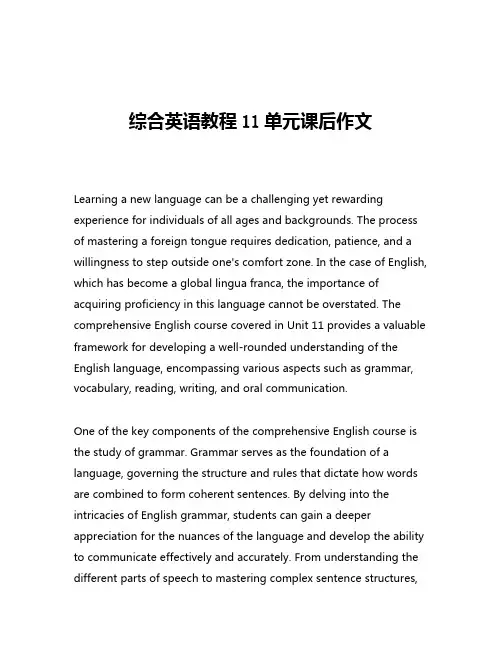
综合英语教程11单元课后作文Learning a new language can be a challenging yet rewarding experience for individuals of all ages and backgrounds. The process of mastering a foreign tongue requires dedication, patience, and a willingness to step outside one's comfort zone. In the case of English, which has become a global lingua franca, the importance of acquiring proficiency in this language cannot be overstated. The comprehensive English course covered in Unit 11 provides a valuable framework for developing a well-rounded understanding of the English language, encompassing various aspects such as grammar, vocabulary, reading, writing, and oral communication.One of the key components of the comprehensive English course is the study of grammar. Grammar serves as the foundation of a language, governing the structure and rules that dictate how words are combined to form coherent sentences. By delving into the intricacies of English grammar, students can gain a deeper appreciation for the nuances of the language and develop the ability to communicate effectively and accurately. From understanding the different parts of speech to mastering complex sentence structures,the grammar lessons in Unit 11 equip learners with the necessary tools to navigate the complexities of the English language.Alongside grammar, the comprehensive English course also places a strong emphasis on vocabulary development. The acquisition of a robust vocabulary is essential for effective communication, as it allows individuals to express their thoughts, ideas, and emotions with precision and clarity. The unit's vocabulary-building exercises, which often incorporate contextual learning and mnemonic devices, enable students to expand their lexical repertoire and enhance their overall language proficiency. Whether it's mastering commonly used idioms, learning specialized terminology, or exploring the nuances of synonyms and antonyms, the vocabulary components of the course empower learners to communicate with confidence and sophistication.In addition to grammar and vocabulary, the comprehensive English course also focuses on the development of reading and writing skills. Reading comprehension exercises expose students to a diverse range of text genres, from academic articles and literary works to business reports and creative writing. By engaging with these varied materials, learners can enhance their understanding of different writing styles, improve their ability to extract key information, and cultivate critical thinking skills. The writing component of the course, on the other hand, provides students with opportunities to practiceexpressing their thoughts and ideas through various forms of written communication, such as essays, reports, and creative narratives. This not only strengthens their written expression but also helps them develop organizational skills, attention to detail, and the ability to convey their messages effectively.Oral communication is another essential aspect of the comprehensive English course covered in Unit 11. Effective speaking and listening skills are crucial for successful interpersonal interactions, whether in academic, professional, or social contexts. The course's emphasis on oral communication exercises, such as group discussions, presentations, and role-playing activities, allows students to practice their pronunciation, intonation, and conversational strategies. Furthermore, these activities help learners develop their confidence in expressing themselves verbally and improve their ability to comprehend and respond to spoken English.Beyond the specific skills and knowledge covered in the course, the comprehensive English program also fosters the development of critical thinking and problem-solving abilities. As students engage with various language-related tasks and challenges, they are encouraged to analyze information, evaluate different perspectives, and formulate creative solutions. This process not only enhances their language proficiency but also prepares them for the demands of the modern, globalized world, where the ability to think criticallyand adapt to diverse situations is highly valued.The comprehensive English course in Unit 11 also recognizes the importance of cultural awareness and sensitivity. Language learning is not merely about mastering the mechanics of a language but also understanding the cultural nuances, social conventions, and historical contexts that shape the way it is used. By incorporating elements of cross-cultural communication, the course helps students develop a deeper appreciation for the diversity of English-speaking communities around the world and the ability to navigate intercultural interactions with respect and understanding.Perhaps one of the most significant benefits of the comprehensive English course is its potential to open up a world of opportunities for learners. Proficiency in English can unlock doors to higher education, prestigious career paths, and meaningful global connections. Whether students aspire to study abroad, pursue international business ventures, or engage in worldwide collaborations, the skills and knowledge gained from this course can serve as a valuable foundation for their future endeavors.In conclusion, the comprehensive English course covered in Unit 11 offers a multifaceted and holistic approach to language learning. By focusing on grammar, vocabulary, reading, writing, and oral communication, the course equips students with a well-rounded setof linguistic abilities. Furthermore, the emphasis on critical thinking, cultural awareness, and real-world application ensures that learners not only develop proficiency in English but also acquire the essential skills and mindset to thrive in an increasingly globalized world. As students embark on this journey of language learning, they can look forward to the personal growth, intellectual enrichment, and exciting prospects that mastering the English language can bring.。
